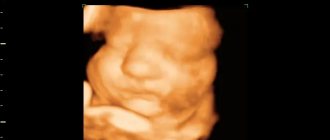What's happening
The fetal immune system is actively working. The baby develops its own antibodies that will protect it after birth. The nervous system functions well, thanks to which the little person is already able to experience emotions, feel pain, hear, see and taste.
At the 32nd week of pregnancy, skeletal development continues. The bones of the whole body grow and strengthen, but the skull must remain flexible so that it is easier for the fetus to move through the birth canal.
Now the child’s height is approximately 42.5 cm, and his weight is about 1700. By this time, the uterus has become too tight for free movements, and you feel the baby’s movements even more clearly. Anything can provoke a baby to kick, from loud sounds to bright lights. But excessive activity of a child at 31–32 weeks is sometimes caused not only by external stimuli, but also by a lack of oxygen, so the mother needs to monitor the frequency and nature of his movements. Normally, while awake, the baby should make from 4 to 6 movements per hour.
Tests and ultrasound
At this stage of pregnancy you will be prescribed the following tests:
- clinical blood test - to exclude iron deficiency, inflammation or infections;
- general urine analysis - for the purpose of diagnosing diseases of the urinary system and gestosis.
At 32-34 weeks of pregnancy, a third planned ultrasound is prescribed, the purpose of which is to assess the condition of the placenta and the compliance of fetal development with established standards, determine its position in the uterus, measure the length of the cervix and establish the expected date of birth. If changes in the uteroplacental blood flow are suspected, it is performed in conjunction with Doppler measurements.
How you feel
At 31–32 weeks of pregnancy, expectant mothers experience an increased feeling of fatigue. Due to the enlargement of the abdomen and the displacement of internal organs, you have to experience many inconveniences. This period is characterized by pain in the hypochondrium and lower back, the latter often radiating to the buttocks and legs. It’s hard for you to walk, it’s almost impossible to choose a comfortable position for sleeping, and you’re worried about the frequent urge to urinate. Laughter, sneezing and coughing are sometimes accompanied by mild urinary incontinence. Exercises aimed at strengthening the pelvic muscles will help get rid of this problem.
Due to compression of the digestive organs at 32 weeks of pregnancy, bitterness in the mouth, heartburn, belching and bloating appear. Almost every pregnant woman is familiar with constipation and hemorrhoids. Another problem that expectant mothers face is difficulty breathing. Sitting increases the pressure of the uterus on the diaphragm and lungs, which can cause you to feel short of breath, gag, and dizzy.
You probably already have swelling. At 31–32 weeks of pregnancy, the problem may worsen. If the swelling is minor, there is no particular reason for concern, you just need to adjust your diet - to do this you need to reduce your salt intake and drink at least 1.5 liters of liquid every day. But if swelling does not go away for a long time, tell your doctor about it, as it may be a sign of gestosis, kidney dysfunction or high blood pressure.
Checklist for 32 weeks of pregnancy
- You are probably now thinking more and more often about the upcoming birth. A visit to your chosen maternity hospital will help you get rid of the fear of the unknown. Find out when it holds an open day and make a list of questions in advance.
- Don't forget about breathing exercises: it helps you relax, reduces anxiety and, of course, will be useful to you during childbirth.
- If your pregnancy is going smoothly, then don’t deny yourself physical intimacy. Sex, even late in life, is not prohibited.
- It’s exciting and pleasant to feel the baby’s movements, but until his leg hits somewhere in the hypochondrium area. To get your baby to get more comfortable, try rubbing your belly or changing your body position.
You can consult on all issues related to pregnancy management by contacting the Women's Medical Center. More than 400 women annually sign a contract with us and recommend us to their friends. Make an appointment too!
Risk factors
The main dangers of 32 weeks of pregnancy are premature birth, gestosis and placental abruption.
Premature labor usually begins suddenly. Unexpected severe diarrhea, watery vaginal discharge (amniotic fluid can flow out in a stream or flow out in drops), girdles in the abdomen and increased contractions are sure signs of a threat to pregnancy.
Brown, bloody discharge should also alert you. In combination with sharp or throbbing pain in the lower abdomen, they may indicate placental abruption. At 32 weeks of pregnancy, this pathology occurs in 0.5 - 1.5% of women. And its occurrence may be associated with physical or emotional stress, bad habits of a pregnant woman and age over 40 years, but most often in the third trimester it occurs due to high blood pressure. If the placenta has separated by 30% or less, then the life of the fetus is practically not in danger, and in this case you can get by with the use of special medications; if it is 50%, then the baby experiences hypoxia and developmental delay occurs. With complete placental abruption, fetal death almost always occurs.
As at other stages, at the 32nd week of pregnancy there is a risk of infection entering the birth canal. This is indicated by purulent, mucous, or unusual color and odor discharge. If the disease is not cured, the baby may become infected during childbirth, which will cause big problems in the future.
Interesting Facts
| Options | Indications |
| Time from conception | 30 weeks |
| Period by month | 32 weeks |
| What month | 8 |
| Dimensions and weight of the fetus | 424 mm, 1700 g |
| Uterus dimensions | VDM - 30-32 cm |
| Pregnant weight | From the beginning of pregnancy 8-14 kg; over the last week no more than 400-500 g |
Your baby is the size of
Chinese cabbage
424 mm Size
1700 g Weight
At this stage, all the baby’s organs and systems are practically mature, and in the event of premature birth, his body is quite viable. The mother's body also prepares for childbirth. Let's find out what else happens to the pregnant woman and the fetus at this stage, but first let's say a few words about methods for calculating gestation periods.
Recommendations
At 32 weeks of pregnancy, it is very important to improve your emotional state. Communicate with your child constantly. Not only mom, but also dad needs to talk to the baby and stroke the tummy: the voices and touches of the parents are different, and the baby reacts to them differently.
If you have fears about childbirth, talk to your doctor about it. A specialist will answer all questions, and you will be able to more objectively assess the situation without surrendering to the power of your wild imagination. To save your nerves, try to protect yourself from negative information, do not communicate with overly emotional people and do not watch scary films. Be prepared for the birth to be easy. Fitness or yoga for pregnant women, hobbies, and pleasant meetings with friends will help you take your mind off bad thoughts.
31 - 32 weeks of pregnancy is the time to choose a maternity hospital (many have not done this yet). If you are going to have a contract birth, it is especially important to find a good doctor. Read reviews, or even better, talk to women who have been given birth by the specialist you are interested in. And having chosen an institution, check what things you need to take with you. Each maternity hospital has its own list, but, as a rule, it contains hygiene items and clothes for mother and baby, diapers and much more. It is also necessary to prepare documents: a referral or contract with the maternity hospital, an exchange card, test and ultrasound results, a passport and insurance.
The baby is rapidly gaining weight, so this week it is important to monitor his diet so as not to “feed” him, otherwise injuries will not be avoided during the birth process. No matter how much you want something tasty, avoid eating sweets and starchy foods. Eat in small portions. At 31–32 weeks of pregnancy, you need products that contain magnesium, zinc, iron and vitamin D. During this period, it is recommended to completely exclude pork from the diet, and to remove excess fluid from the body and normalize intestinal motility, it is advisable to drink dried fruit compotes . Tormented by attacks of flatulence? Enter a “moratorium” on legumes, cabbage and rye bread, and also try not to drink 30 minutes before meals and for the same time after.
Starting this week, rest 2 to 3 hours more than before. Avoid infectious and colds, since drug treatment during this period is undesirable. Sex during the 31st – 32nd week of pregnancy is not prohibited and is even necessary (but only in the absence of contraindications), because intimacy is a wonderful way to get emotional release. In addition, during orgasm, the uterus contracts, which means that a kind of prenatal preparation occurs. But keep in mind that semen contains prostaglandins. These biologically active substances help soften the cervix, therefore, in order not to provoke labor, you must use a condom.
What to discuss with your doctor
- If you cannot cope with increased anxiety during this period of pregnancy on your own, consult a perinatal psychologist. He will help you analyze and accept your emotions and, if necessary, prescribe therapy. You can find such a specialist in many maternity hospitals and antenatal clinics. Admission here is free.
- If your stomach often pulls, the pain is probably associated with stretching of the tissues of the growing uterus, as well as with the gradual divergence of the pelvic bones. However, expert supervision will not hurt. Find out how to distinguish physiological discomfort from pathological uterine tone or other pathologies.
Beauty and accessories
Pay special attention to your breasts at week 32. In anticipation of the birth of the baby, the mammary glands become fuller and firmer, which cannot but please the expectant mother! But this coin also has a downside: after the birth of a child and the end of the breastfeeding period, they can sag and lose their former beauty. Special creams and gels will help you maintain beautiful breasts. It’s better to start using them now. They tighten the skin and, with regular use (use the products after a shower), significantly improve blood circulation. Ideally, preparations that contain natural ingredients such as ginseng, mint, hops and horsetail are suitable.
Continuing the conversation about breasts during pregnancy, we cannot fail to mention colostrum: its secretion may increase at 32 weeks. But it is strictly forbidden to “squeeze out” the milk - such stimulation causes contractile activity of the uterus, which is now completely undesirable.
Good to know
How to hold a Baby shower? Desserts for mothers and gifts for babies
Drugs for placental insufficiency
How the placenta develops: what is premature aging of the placenta
Connecting link. About the formation and functions of the placenta
Complications of pregnancy by trimester
Why does pregnant women have a stomach ache?
All texts for pages about mother and baby were kindly provided by RAMA Publishing - these are chapters from the book by Svetlana Klaas “Your Favorite Little Man from Conception to Birth”, reviewer Irina Nikolaevna Kononova, Candidate of Medical Sciences, Associate Professor of the Department of Obstetrics and Gynecology of the Ural State Medical Academy (Ekaterinburg).
Useful advice for future parents
Any communication between parents and the child before and after his birth, if mom and dad are in a good mood or even if they are a little worried (but this is definitely not stress or conflict), has a developmental effect.
The more often communication occurs, the stronger the developmental effect. Developmental communication with the Baby before birth is initiated:
- mother - as a rule, it is associated with the current mood, the desire to communicate with the Baby and feel like a mother, and also if the Baby does not communicate for a long time or hiccups. In the last weeks before giving birth, mothers, especially when there is no one around, enjoy communicating with their children out loud, telling them what they are doing or going to do, discussing programs, news, etc. At the same time, the pronoun “we” often appears in their speech: “Let’s go for a walk with you,” “Isn’t it time for us to have lunch?”, “Dad will come soon, let’s look out the window,” etc. The baby becomes their main interlocutor - and the best listener in the world (it makes sense to learn this from him);
- The Baby himself, his active movements, movements and pushes, as well as somersaults - this feeling is difficult to convey in words (but you know what we’re talking about). The active actions of a son or daughter do not go unnoticed by the mother. The very first reaction is to put your hand on your stomach to the place that is closest to the epicenter of the Baby’s activity, the second reaction is to use words to encourage, console, and scold the naughty boy. This is incredible, but even without seeing their Baby, mothers are able to determine by his actions, their intensity and tension whether they are associated with his good mood or discomfort;
- dad - in the morning or when he comes home from work, as well as during moments of evening rest or on a day off. Dads are great inventors! And they can do things that mothers can’t do or wouldn’t even think of. For example, your husband can kiss a protruding back, fist or heel, but you cannot. He can put his ear to it and hear what the Baby hears inside you, as well as how he moves there, but you cannot. Dad can speak kind words very close to the Baby’s ears; he can easily act out a theatrical performance using improvised means (a book, a lighter, a spoon, a toy, etc.). Dad can grunt, bark and meow from the bottom of his heart, and also (oh horror!) tell non-childish jokes. Dads know how to play hide and seek with their kids and even... tickle them. And if the Kids could react to their father’s actions, they would probably squeal with delight. Dad can “get up” with Baby and, tired, do something else or fall asleep. And you will have to calm the naughty guy - and so on for the rest of your life. But how nice it is to see that dad loves the child, and the child loves dad!
Is it normal or abnormal if your stomach hurts?
Stitching and pulling pain on the sides of the abdomen occurs due to softening and stretching of the ligaments that hold the uterus. Such pain is not dangerous and can appear suddenly during a cough, when rising from a chair or changing the body position of a pregnant woman.
By this time, false training contractions become a common occurrence for expectant mothers. With their help, your uterus prepares for the upcoming birth. False contractions do not occur regularly, they are practically painless and not at all dangerous.
If contractions become painful, periodically repeat and intensify - even in the absence of rupture of amniotic fluid, you must immediately call an ambulance. Most likely, your baby decided to get acquainted with this world ahead of schedule.
If you experience nagging, spasmodic pain in the lower abdomen, or liquid yellowish discharge appears, you can also talk about the early birth of a child. Hurry to call an ambulance and get ready to go to the maternity hospital.
If pain in the lower abdomen is accompanied by bleeding, in this case we can talk about placental abruption. By the way, with placental abruption, there may be internal bleeding that is not noticeable to you. In this case, you will not see any bleeding, but the pain in the lower abdomen will be incredibly severe. You should definitely call a doctor, because such symptoms are very dangerous for both mother and baby.









